What Are the Required Skills for Today’s Digital Workforce?
February 17, 2015 6 Comments
As I spend a great deal of time every year looking at the latest technological advances for the enterprise, I’ve noticed a trend in recent years that’s long been true but is clearly markedly accelerating. That trend is that technology has officially pulled well ahead of the workplace skills of even the most proactive manager or line worker. It’s not that the digital possibilities are getting ahead of our businesses, it’s that high technology itself is proliferating so rapidly in terms of potent and truly transformative new products and services (social software, collaborative economy, wearables, 3D printing, and the whole hype cycle) that it is now very difficult today even for experts working on the subject full time to keep up.
I posited today on Twitter that we need to figure out a way to catch up or, as Andrew McAfee seriously suggests, perhaps the robots will just end up doing everything for us as they might be the only ones that can manage.
Or is there a way forward for our organizations? Are there new ways to think about our digital workplace skills that allows us to take our thinking up to a new plane, the next meta-level of thinking and working where we have much higher leverage, can manage change that is an order of magnitude or greater in volume than today, work in fundamentally better and smarter new ways — and perhaps even work a bit less — yet produce much more value?
We generally recognize that have to do something to improve our digital metabolism, as I see organizations struggle mightily these days with digital change and transformation, and often not getting very far.
Thus it’s become pretty clear that one of two things is going to happen: The world will continue to pull ahead of the average workplace, as our internal rates of change are greatly exceeded by the marketplace. We will steadily become irrelevant and ineffective, eventually replaced by digital startups and better-adjusted competitors. Or we’ll find entirely new ways of improving our capabilities in a way that allows us to maintain some kind of parity with progress in the world. (Whether technology change always represents progress is a discussion for another post.)
This means we have to find a way to change our selves and our workplaces, or the market will do it for us the hard way. Disruption is what happens when something new comes along that changes the underlying rules of the game. If we are doing the disrupting, it can actually be very good for us. When it’s imposed on us, then the results usually tend to be unfortunate. So we must be doing the disrupting to ourselves, and that begins and ends with shifting our mindset and perspective, especially in deeply understanding the nature of the truly pervasive digital operating environment we now find ourselves in.
Looking at the state of the digital workplace today, which I’ve been mapping for years now, and we can see from sources of hard data about what’s happening such as Jane McConnell’s terrific surveys, that “most organizations are just starting their journey to an effective digital workplace.” That’s Jane’s quote, but my emphasis: 30 years into the personal computer and networking revolution, and most organizations are still very early in their journey and often losing ground.
What Skills will Self-Sustain Digital Workers?
To be fair to IT and HR departments around the world, the digital workplace target does move incredibly fast and is picking up speed. And there never was a finish line. Fortunately, I believe there are novel, effective and increasingly well-understood new ways for most organizations to address their current digital workplace gaps, and it’s not (just) by “giving up non-essential control”, deploying liberal BYOD/BYOT programs to cultivate employee-led change, figuring out how to do things like learn or change behavior faster, or any of the ten strategies I’ve previously recommended.
No, instead it is by giving our workers genuinely transformative new digital skills that gives them the ability to adapt, provides them with the most relevant digital tools and platforms, conveys new motivations, and fosters the know-how to re-imagine their knowledge work in brand new ways that are much more adaptable, rich, scalable, and resilient — even embracing of — the inevitable march of digital progress.
While no one can yet represent that we have a full understanding of what the key next-generation digital skills of successful organizations are — as they are largely still being discovered — there is a broad realization of the important skills we know of already. All of the skills listed below are ones I’ve either seen being used successfully by large organizations or actively piloted with some promise. These should be on your shortlist as you plan your updates to the digital workplace, as I believe each is essential for working in a much more sustainable and meaningful way in our digital age. The enlightened leaders of today will enable these skills to tap directly into the “New Power” that digital networks are conferring on organizations that are willing and able to adapt.
Related: Today’s Digital Priorities for the C-Suite
The Essential Next-Generation Digital Workplace Skills
Working Out Loud
Also known as Open Work or Observable Work, this is the act of lightly narrating your workstream, usually on an enterprise social network, but it can be done using any participative medium. Working out loud allows one to let the network do the work (see below) and breaks down the silos that have rebuilt up with virtual workplaces and today’s far-flung multinational teams. Perhaps most importantly however is that is the key to unleashing agility using digital networks as it automatically collects institutional knowledge and critical methods, makes onboarding new employees much easier, and frees up your knowledge to work for the organization continuously while still ensuring your contribution is recognized. Credit goes to Deutsche Bank’s John Stepper who has done much to make this key digital workplace skill so well known recently.
Digital Sense Making + Personal Knowledge Management
These skills are something we’ve seen CHROs and HR departments consider how to provide in recent years as cognitive overload has become a common workplace malady. We now have many tools, channels, apps, and devices we must use in the workplace, and they will only grow in number, probably extensively. The attention they demand is squeezing out the time to do the quality thinking and analysis that we so badly need knowledge workers to spend time on. Harold Jarche has done excellent work over the years in mapping how activities like Personal Knowledge Management (PKM) is a discipline and practice that digital workers must acquire to navigate today’s knowledge-dense workplaces. PKM provides the tools, techniques, and time for consistent yet meaningful sense making. Next-generation organizations will actively work to reduce needless activities like excessive meetings by creating required time for the strategic activities of acquisition, management, and sense-making of digital knowledge. These skills are foundational to adapting more swiftly and organically to rapidly changing operating environments.
Open Digital Collaboration
As I’ve recently explored, collaboration is becoming the most important strategic activity in organizations, even becoming a vital top-level corporate strategy and major fast-growth new business model as well. Workers today must be experts in digital collaboration techniques, know all the relevant platforms, and maintain an understanding of the current collaborative “channel catalog” at all strategic levels. This includes the team and project levels, all the way up to the very business itself and its relationship with suppliers, partners, and customers. Becoming a connected, sharing knowledge organization using digital tools in global networks has, for example, become a top priority of large organizations like Bosch, BASF, Bayer, Michelen, and many others, some of whom even use techniques to ensure knowledge and observable work are kept out in the open. Open collaboration is a core capability of digital native organizations because it is how network effects and other power laws of networks are triggered, providing the scale and (literally) exponential ability to drive rapid change.
Related: How to Deliver On A Modern Enterprise Collaboration Strategy
Network Leadership
Today’s digital leaders — whether they are senior executives, managers, team leads, or line workers — must be able to wield influence and guide others over digital channels. Digital networks provide uniquely powerful platforms for self-expression that leaders can use to enlist others in common objectives, gain inputs from colleagues and especially weak ties, change minds, and drive collective action towards outcomes. In the industrial age, leadership was wielded through physical presence and (largely) one-way communication through traditional media. Today’s leaders must deal with networks that can and will engage back, and they must be effective at leadership through two-way dialogue, consensus building, and thought leadership. Showing the importance of this subject in leadership circles, the highly respected Executive Board has an excellent white paper on the Rise of Network Leadership that explores skills that must be developed in our workforce today.
Radical Transparency
In today’s digital world, rightly or wrongly, privacy is rapidly eroding and is now sometimes gone altogether. Forward-thinking organizations are going to take advantage of the change to build more scalable and sustaining trust, stronger relationships with their workforces, communities, and customers, and get the right information from where it is to where it needs to be. We’ve learned that any entity where people believe secrets that affect them are being kept is rightly regarded with considerable skepticism and growing cynicism. Edelman’s yearly Trust Barometer, whose results have been tracking the plummeting levels of trust worldwide in the last few years shows that the rules have changed. It’s often said that sunlight is the best disinfectant, and the proof in new ways of working has been the consistent positive results that more open and better networked organizations receive. Achieving this level of openness, however, will be one of the most challenging yet vital changes for most organizations to make: Creating a culture of sharing and near total transparency that drives much better decision making, faster feedback loops, stronger relationships, less searching for information, less customer and workforce frustration, and yes, especially more employee engagement.
Digital DIY Know-How
Maker culture, which can be quickly sampled in its current state by a quick browse through the thousands of active projects on Kickstarter, is an offshoot of the Do-It-Yourself movement, a trend towards finding ‘hacks’ that improve something by wielding simple but often unexpected solutions. While I believe this skill is not necessarily natural and amenable to every worker, hacking our workplace has become a common concept, often used to get around workplace barriers or antiquated ways of working without violating rules or policy. More recently, deliberately creating a hacker culture or business has been seen in the rise of hackathons and employee product startups/incubators, and other employee-led change processes. Encouraging digital DIY skills means tapping into a widespread but latent capability for change, improvement, and entrepreneurial spirit. Note: I’ll be exploring this topic more at my Ignite talk at IBM InterConnect next month in Las Vegas, on my session on digital leadership techniques. I’ll post the link to the slides here afterwards.
Letting the Network Do the Work
Perhaps the most truly disruptive of all the skills I’ve listed here, this refers to the technique for using the scale and asymmetric resources on the network (local, enterprise-wide, or preferably, global) to accomplish often otherwise impossible tasks. I’ve explored this strategic technique at length before as well as captured some amazing case studies in efforts like Fold.It. While some of the above techniques will naturally trigger this outcome (Working Out Loud most notably), the best results in my examinations of dozens of case studies comes when it is designed as an architecture of participation.
Are there other skills that should be here? Almost certainly. But as with all change today, so many parallel tracks often form that there simply must be a hierarchy, what’s most important, what’s next, and so on. I will collect and publish our updated view of all major digital workplace skills later this year, but I believe the ones above are at or near the top of the hierarchy and will genuinely enable rapid, transformative change in organizations. Visionary organizations that intend to survive and thrive in the near future will work on developing these skills and creating a workplace where they can be used to their fullest.
I would also like this to be the launching point for a more meaningful collective discussion of what we really need to do to modernize our workplaces for today’s operating environment. Please leave your comments below or better yet, write something that adds to this. Let’s work out loud and let the network do the work.
Additional Reading:
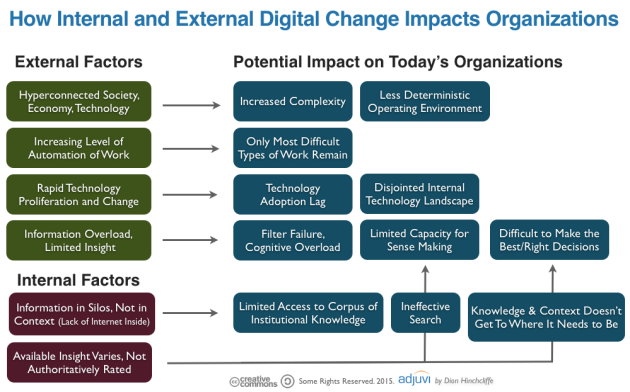
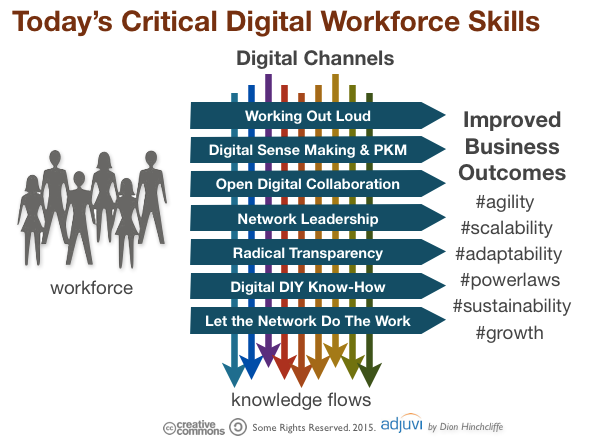




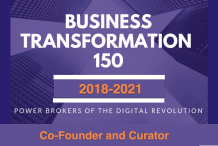








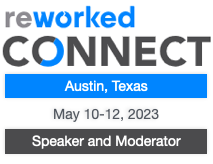
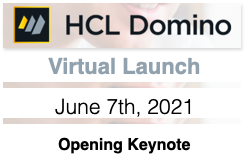






























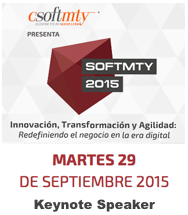


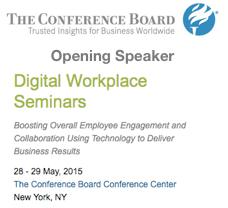


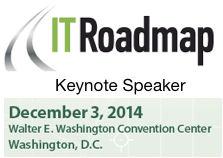







Reblogged this on As the Adjunctiverse Turns and commented:
Don’t let the emphasis on workforce and business organization mislead you into thinking this article has no relevance to academia or the adjunct higher-ed hands toiling in the groves of academe
Pingback: Expert Discussion: How to make digital collaboration work? - Enterprise Digital Blog
Pingback: Expertise and Novelty: Taking action when facing the unknown | In the Learning Age
Pingback: MOOCs in Workplace Learning - Part 5: Skills Learners Need Today | Learnnovators
Pingback: [EN] Dion Hinchcliffe and 4 Principles of today’s digital workplace | ZDNet – Digital Naiv
Pingback: Toward a Transparent World at Work | Everyday Feedback